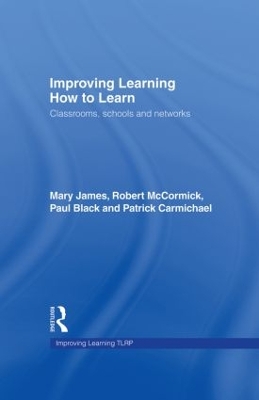Improving Learning
1 primary work • 2 total works
Book 9
Improving Learning How to Learn
by Mary James, Paul Black, Patrick Carmichael, Mary Jane Drummond, Alison Fox, Leslie Honour, John MacBeath, Robert McCormick, Bethan Marshall, and David Pedder
Learning how to learn is an essential preparation for lifelong learning. Whilst this is widely acknowledged by teachers, they have lacked a rich professional knowledge base from which they can teach their pupils how to learn.
This book makes a major contribution to the creation of such a professional knowledge base for teachers by building on previous work associated with ‘formative assessment’ or ‘assessment for learning’ which has a strong evidence base, and is now being promoted nationally and internationally. However, it adds an important new dimension by reporting the conditions within schools, and across networks of schools, that are conducive to the promotion, in classrooms, of learning how to learn as an extension of assessment for learning.
There is a companion book, Learning How to Learn in Classrooms: Tools for schools (also available from Routledge), which provides practical resources for those teachers looking to put into practice the principles covered in this book.
Improving learning by effective teaching is the core business of schools and all education policy and innovations in practice should support the realisation of this main aim. Much is known about what constitutes effective teaching and learning but implementation often falls short because the changes in beliefs, practices and roles that this demands can be challenging, especially in seemingly risk-averse contexts.
This book provides a framework, informed by sound research, to give confidence and guide teachers and schools to review and develop their practice for the benefit of their students. It provides a concise synthesis and overview of the main findings of the 22 schools projects, and related thematic work, within the Teaching and Learning Research Programme, the largest co-ordinated programme of educational research ever conducted in the UK. By using the TLRP’s ten principles as an accessible structure, it locates these insights within the wider international field of research and scholarship and draws out implications both for education policy and the practice of teachers and school leaders.
The ten principles cluster under four main headings, which cover the whole spectrum of vital considerations related to teaching and learning:
- Educational values and purposes
- Curriculum, pedagogy and assessment
- Personal and social processes and relationships
- Teachers and policies
Whilst being a substantial and wide-ranging book in its own right, it also acts as a gateway to other outputs from TLRP research, including other books within the Improving Learning series, which are both high in research quality and high in practical relevance.

